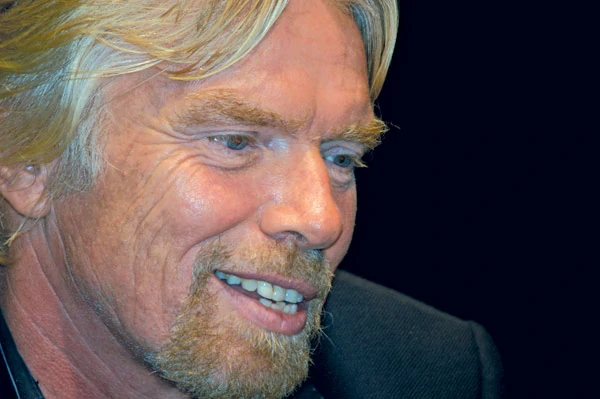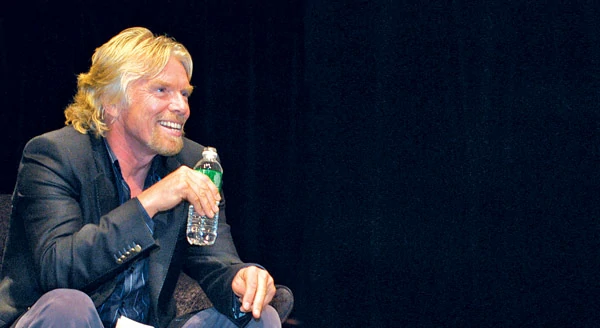
Virgin CEO Richard Branson tells The Daily Beast he has an escape plan for the end of the world – an environmentally sound spaceship.
Over the last four decades, Richard Branson has launched more than 200 companies to create his Virgin empire, including Virgin Galactic, the first commercial venture in space exploration. He’s also devoted significant amounts of his time and money to developing green technologies aimed at combating climate change. So perhaps it’s fitting that he should eventually combine the two interests. In a wide-ranging interview with The Daily Beast, Branson talks about green space travel, developing an interstellar escape plan in case of environmental catastrophe, and his “Carbon War Room,” a group of entrepreneurs who know a thing or two about going green and getting rich.
By Matthew Dakotah
FROM Green Giants:
An Occasional Series of Interviews with Leaders on Environmental Issues
© 2010 RTST Inc. (Distributed by The New York Times Syndicate)
Virgin Atlantic was the first airline to conduct a commercial test flight using biofuels in early 2008. What’s the latest on that program?
We’ve invested in a company called Gevo and they’ve developed a fuel called isobutanol, which is almost 100 percent carbon neutral. We are in the process of testing that for aviation use and we’re hopeful – but not guaranteeing – that within five years most of the Virgin Atlantic planes can be flying on that fuel. We’re also in discussions with others that have invested in algae-based fuels.
The five-year time frame is more ambitious than I would have thought.
The troubles of the world are worse than I thought, and therefore we’ve got to be ambitious in dealing with them.
You have a track record of bringing people together to do just that. In 2007, you formed The Elders – a group of global diplomats – with Nelson Mandela and Peter Gabriel. And last year Larry Page of Google, Jimmy Wales of Wikipedia, and former British Prime Minister Tony Blair, among others, came together at your home on Necker Island to brainstorm about ways to fight climate change. Are any new partnerships under way as a result of that meeting?
That was a forerunner of the Carbon War Room. If carbon is the enemy, you set up a war room. For the last three days, I’ve been tucked away in a house outside New York City setting it up. There are major issues, but major opportunities. Take the shipping industry – they are just as big a polluter as the airline industry, if not more. But they’ve managed to keep under the radar and done almost nothing about their carbon footprint. They could save vast amounts of money and contribute a lot to the world if they got their act together. So we’re working on ways to try and get in there and educate them.
And how to make it economically feasible for the industry at the same time.
Yes, to tackle these issues so the businesses themselves do not suffer financially. We’ve got a lot of entrepreneurs working on it. If there’s a way that businesses can benefit from tackling carbon that’s obviously a win-win.
Who else is involved?
We’ve just named Jigar Shah, founder of Sun Edison and former manager of U.S. marketing at BP Solar, as our CEO.
Virgin Galactic President Will Whitehorn recently made the case in The Guardian that advances in space travel will benefit the environment. What are your long-term dreams for Galactic beyond the initial space-tourism flights?
Because we’re launching people from the air and not the ground and our technology is about 50 years younger than NASA’s, there’s almost no carbon output to get people into space. We can also get things like satellites into space at a fraction of the current carbon output. And once the space program is up and running we’ll see if we can’t do intercontinental passenger flights at very rapid speeds by getting people out of the Earth’s atmosphere with hopefully almost zero carbon. I think it’s some years off, but may be attained.
Have you contemplated anything even further out?
One of the reasons Stephen Hawking is going to space with us is that he wants to see it explored more. He’d like to see us start populating other planets in case something happens to people on Earth. As he rightfully says, chances are mankind will one day be destroyed on Earth. So it makes sense for us to try and set up a proper base somewhere else. Whether our work on the Virgin Galactic program will help or not, we’ll have to see. But once you get private companies investing in space, it’s likely things are going to move more quickly. And there are lots of possibilities worth exploring once space travel becomes the norm rather than the expensive exception. Capturing solar would be one, putting mirrors in space to reflect some of the sun’s rays and slow down the heating process might be another.
So you now do planes, trains, and spaceships. Ever consider automobiles?
We’d only take it on if it was carbon-neutral, and I think electric cars are potentially the future. So if the right electric car came along, we would certainly look at it. But it isn’t something we’re actually working on at the moment.
What about shaking up the train system here in America?
Obama has said he wants more trains in America, and we have a special interest in that. We’ve pretty well finished the job in the U.K. and are ready for new challenges.
Obama Has Said He Wants More Trains In America, And We Have A Special Interest In That. We’ve Pretty Well Finished The Job In The U.K. And Are Ready For New Challenges.
Have you received any feedback from the administration?
We are having discussions with them, and we’ll see how that goes. We’ve got quite a lot of experience and are looking at where the administration wants to invest its money.
In September 2007. you launched The Earth Challenge with a $25 million prize for whoever can demonstrate a commercially feasible way to measurably extract greenhouse gases from the atmosphere. Any submissions of note thus far?
There isn’t a slam dunk yet, but there have been a number of people who have submitted plans for biochar.
And for those who aren’t familiar, what is biochar?
You take the waste product in fields, turn it into charcoal and plow it back into the fields again. It becomes very good fertilizer with good water retention. But most importantly, it takes carbon that would otherwise go into the atmosphere and buries it for hundreds of years. If a third of the waste product in all fields globally could be plowed back in that would be the equivalent of eliminating all the carbon released from the burning of liquid fossil fuels every year. And if you did the same thing with waste product from homes, factories, and offices it could make a massive difference. We are looking at whether we can help to develop machines to do this efficiently.
You have also established the Virgin Green Fund to invest in clean technology. What companies within the current portfolio hold the most promise?
Solyndra is very exciting because it’s come up with a way of utilizing the sun more efficiently than other solar companies, and I think that’s why the Department of Energy recently granted them a $535 million loan guarantee. And in addition to planes, Gevo’s isobutanol could be used for a whole host of other purposes like automobiles and buses. Unlike ethanol it doesn’t freeze at 15,000 feet, can be mixed with normal fuels, goes down existing fuel lines and doesn’t absorb water.
Is there a risk of competing with food crops once these biofuels are scaled for commercial use?
The algae-based fuels are literally made in big barrels. Isobutanol can be sugar-based. The world is awash in it and it’s not good for you anyway. Prices are at all-time lows and the kind of land that’s used for sugar isn’t used for food-based crops.
You are also attacking the issue through increased fuel-efficiency and carbon offsets. Is that right?
Yes. We’ve got the youngest fleet and we’ve pushed Airbus and Boeing into making carbon composite planes. We offer a carbon offset for people who book on our flights, but I think the most important thing is investing in clean fuels.
What do you want to see on the climate policy front?
We want to see a level playing field on a global basis. Industry shouldn’t mind paying more for its carbon as long as that money is put toward good, clean alternatives. We want to see an agreement at Copenhagen. I’m hopeful there will be a breakthrough.
(Matthew Dakotah, who is conducting a series of interviews with global environmental leaders for The Daily Beast, is an award-winning journalist who has directed 14 magazine and website redesigns and worked at Hearst and Emap. As vice president, group editorial director of Homes & Lifestyles Publishing, he initiated ongoing coverage of sustainable development and secured contributors from The New York Times, The Washington Post, Architectural Digest and Princeton.)






